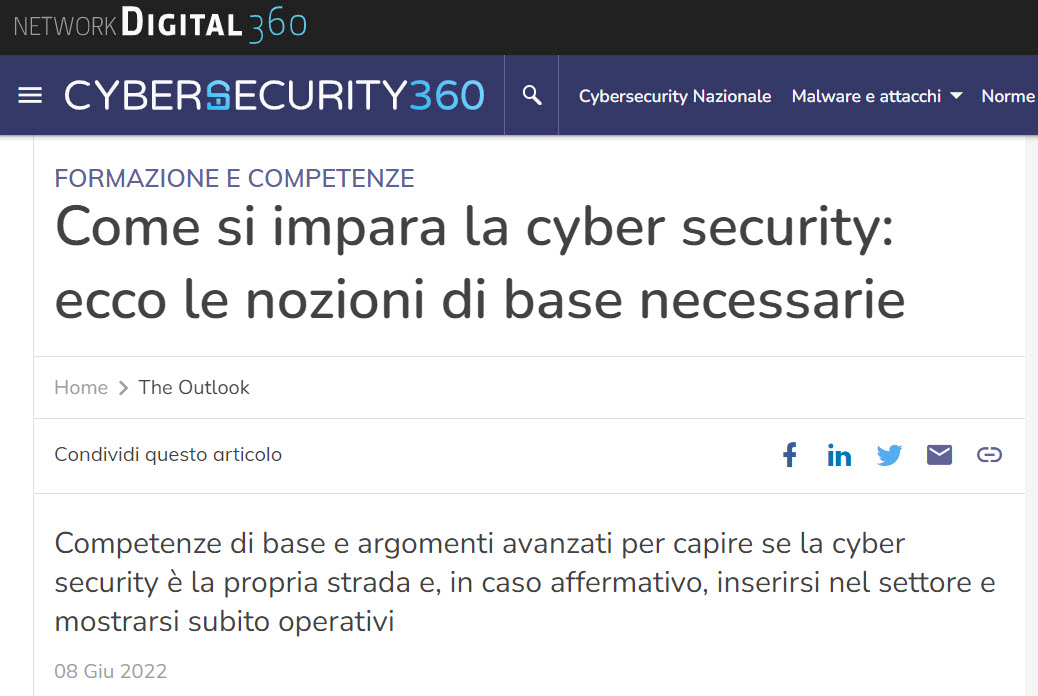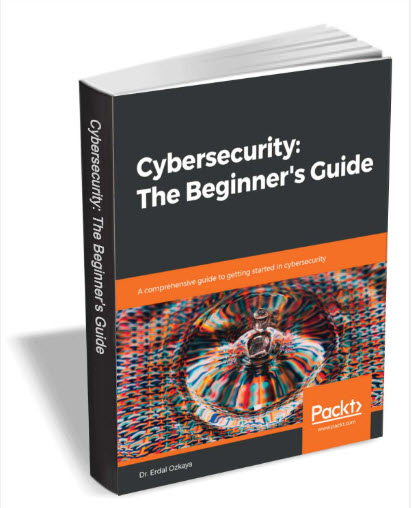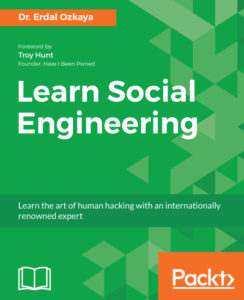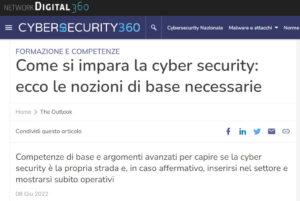
How to learn cybersecurity, Great Tips from Italy
How to learn cybersecurity, Great Tips from Italy
My books are getting recommended by teh popular Italian Security Web site thanks to Riccardo Meggiato. Below is the article he wrote about how to gain cybersecurity basics and how my books can help you to do so. The original article is written in Italian, so the below text is based on Bing Translate, and of course below you will also find the original article and the link to their web site
News like that encourages me to do more, seeing the impact of authoring good books globally… We are for sure better together.
The Original Link : https://www.cybersecurity360.it/outlook/come-si-impara-la-cyber-security-ecco-le-nozioni-di-base-necessarie/
Basic skills and advanced topics to understand if cyber security is your way and, if so, enter the sector and show yourself immediately operational.
The cyber security sector is controversial and debated and if this is evident from the choice of tools and frameworks, so divisive for the professional public, it is even more so when it comes to talking about training. The necessary path, that is, to start from not knowing anything about the subject and get to live on cyber security.
A lot of employment, but high difficulty
According to Gartner, the information security market will be worth $170.4 billion by the end of 2022, which makes it the subject of more or less genuine interest by companies and professionals. On the other hand, a research by Comptia, tells that only in the United States there are over 460 thousand job advertisements concerning the sector, while Cybersecurity Ventures has produced an eight-year study from which it emerges that in the cyber security sector the percentage of uncovered positions has grown by 350%. Going from one million in 2013 to 3.5 million in 2021. And the trend seems to increase, given that India alone is expected, by 2025, to have the beauty of 1.5 million vacant positions, in cyber security, by 2025.
Cyber security is a difficult job
Whichever way you look at it, cyber security is both seduced and abandoned: a market that grows and requires more resources, but the gap between supply and demand is widening more and more. We often wonder why this phenomenon is so many and the answers are many and all worthy of consideration. One of the main ones is that, fundamentally, a good part of cybersecurity activities require very high skills. They are “difficult”, to put it briefly.
To this is added a non-negligible factor: never, as in cyber security, training must be continuous, which leads us to say that cyber security is not a job that is learned once and repeated forever, and if anything the exact opposite is true: you learn continuously and, often, the notions acquired are used to complete activities that you do for a short time.
Because cyber security is a scenario that is constantly changing and what is useful today becomes insufficient tomorrow. That of updating, moreover, is a theme that should be close to the heart, first of all, to the company that hires professionals: some time ago, a research conducted on over 3300 IT professionals, revealed that 43% of respondents considered the updating path offered by their employer inadequate.
There is, then, a slightly more submerged issue, but that for those who work in the sector is evident: saying “cyber security” means little or nothing, because this world is becoming increasingly varied and, therefore, requires increasingly vertical skills. To the point that those who are intrigued by it see a barrier of entry that can intimidate the less daring.
An authoritative opinion
Defining the basics necessary for a career in cyber security is a complex task, which obviously bends to individual ideas and experiences. For this reason, it is first necessary to choose an authoritative opinion. I chose Dr. Erdal Ozkaya’s, for two distinct reasons. The first is his resume and an impressive list of awards won. Among the most recent ones:
- Best CISO for Banking and Financial Sector (2021)
- CIO Online & IDC: Top 50 Technology Leaders (2021)
- EC Council CEH Hall of Fame (2021)
- Tycoon Success Magazine, Most Powerful 10 Middle East Businessman (2021)
- CISO Top 50 Award by Security ME Adviser Magazine & Tahawultech.com (2020)
- “Super Hero CISO”, by Enterprise IT Magazine
- Khaleej Times “CISO Power List”
- Legend Cybersecurity Pro by GEC Media (2019)
- Hall of Fame, CISO Magazine(2019)
- Cybersecurity Influencer of the year (2019) , CISO Magazine
- Cyber Security Professional of the year MEA (2019)
- Microsoft Circle of Excellence Platinum Club (2017),
- NATO Center of Excellence (2016)
- Security Professional of the year by MEA Channel Magazine (2015), Professional of the year Sydney (2014)
The second is the long publishing production, which sees him as the author of some of the best books in the industry. Over twenty volumes including “Cybersecurity: the beginners guide: a comprehensive guide to getting started in cybersecurity”, published by Packt Publishing and which has garnered positive appreciation and reviews. A book of about 350 pages whose purpose is precisely to direct those who want to enter the world of cyber security (not hacking, needless to say) in an itinerary of increasingly specific skills.
Now, one may or may not agree in the order in which certain notions are presented, but it is common ground that all the notions presented should be part of the baggage of any professional working in the world of cyber security, in any role.
And it is precisely from this assumption that we will try to draw our list of “desired”.
How to learn cyber security: historical notes
Although cyber security is a very young subject, it has experienced and is experiencing such a hyperbolic and fast development that it is essential to have a picture of the dynamics that gave birth to it and made it evolve to the current state, especially to understand how the way of reasoning and planning attacks by cyber criminals has changed.
Networking
Ozkaya’s book talks about it in a scattered way, perhaps because it is a bit like the salt of this sector. The foundation of cyber security are networks, their architectures, their development, their elements and how all these communicate with each other through protocols.
Programming
Although we move in an industry that increasingly automates processes, learning one or more programming languages allows you to acquire a more analytical mentality, not to mention that you have the opportunity to better understand the anatomy of some threats, customize the tools that allow it (and there are many) or create them from scratch, if necessary.
Languages? Python, first of all, which is very accessible and versatile, and maybe even JavaScript, to understand the nature and mitigation of most of the web-app attacks.
Wanting to exaggerate, C and assembly, which allow you to understand machines and operating systems and low level and, consequently, how they develop and move some of the most fearsome cyber threats.
Reactive, proactive, and operational security
Once the real basics have been defined, it is time to acquire the first relative notions and a truly professional approach to the subject. And among these, therefore, the main defense models, importance and implementation of vulnerability assessment and management, monitoring, business continuity, disaster recovery, structure and operation of a SOC, SIEM and SOAR systems, to get to the analysis of network traffic.
Professionals
With a basic baggage like the one seen so far, a hypothetical candidate for the world of cyber security has enough to understand if this is really his way (otherwise it is likely that he has already understood it after the first arguments).
If so, it is time to discover, specifically, all the figures that populate cyber security, in order to identify if someone tickles it more than others. And, at that point, focus your training plan on even more specific topics, such as malware analysis, cyber security management, SOC analysis and so on.
Some final considerations
Is what we have seen a complete program? Obviously not and to be honest it is not even a program. It is a set of essential skills that would like to be of help to those who intend to do seriously with cyber security. A sort of orientation scheme on the basis of which to establish if it is a viable path and, if so, how to follow it and with which training tools.
And at that point everything you already know is worth it: that you need practice, you need experience, you need comparison, you need conferences and webinars, you need continuous updating and everything else. Many, perhaps, will be frightened, but someone will find answers to the question of questions: how do you learn cyber security? Safe travel.
Networking sociale
A questo argomento Ozkaya dedicata addirittura un apposito capitolo. Si tratta più di una soft skill, ma nessuno può negare l’importanza del saper tessere dialoghi e rapporti umani con gli altri membri del proprio team e, in genere, di tutto il mondo della cyber security.
Che, se vogliamo, è propedeutico anche ad acquisire le meccaniche del social engineering.
Machine learning e intelligenza artificiale
Vista l’abbondanza di posizioni vacanti, il mondo della cyber security non ha voluto farsi trovare troppo scoperta, e questo è uno dei motivi per cui si sta facendo molta ricerca nell’ambito dell’intelligenza artificiale in questo settore. E questo ha portato ad avere oggi, sul mercato, una miriade di proposte che fanno dell’AI il loro cavallo di battaglia.
Padroneggiare l’argomento significa, dunque, muoversi con consapevolezza tra le tante tecnologie che ne fanno uso.
Data science
Un argomento che potrebbe essere incluso nel precedente, ma così importante, nella cyber security, da meritare una trattazione a sé. E il giusto riconoscimento in un piano formativo dedicato.
La data science è un elemento imprescindibile per molti aspetti, in questo settore, ma è soprattutto nella threat intelligence che al momento trova la sua massima espressione.
Tecnologie
It is, of course, the area where to pay more attention and it is no coincidence that Ozkaya has spent a lot of time on it, in this as in his other books.
Here you are really spoiled for choice, but following the author’s logical thread the essential elements are mobile security, cloud security, advanced data security, incidence response, digital forensics, enterprise security, penetration testing, DevSecOps methodologies, IoT security, user behavior analystics, endpoint detection and response (EDR).
Cybercrime
Often the attacker’s thinking is underestimated, while it is useful to study, in an analytical way, the reasoning that leads to the development of a criminal plan digitally.
The motivations, the social and economic aspects, the organizational structure of a gang, the geopolitical differences of the main actors of cybercrime, the elements that are acquired and evaluated to arrive at a social engineering campaign.
Before the route, we understand the subjects
At that point, doubts, questions and perplexities arise: graduation yes or degree no? What addresses? Computer engineering or computer science? Master? Certifications, yes or no? What? At 20, 30, 40 years old are you old for cyber security? These are some of the questions that those who would like to approach this sector ask themselves and they are all more than legitimate. Giving you an answer, however, offers a partial view depending on the interlocutor, with the result of descending into a feud that those who bazzle around Quora, or in the good living rooms of cyber security, know very well.
The focus of this article, therefore, is to draw a guideline on the basic skills that those who want to pursue a career in cyber security should have. A sort of reasoned guide to the basics to understand first of all if it is a path that you really have the interest to undertake (and this is a step often underestimated). And, only at that point, to create your own training plan drawing from degree courses, certifications, books, internships and everything that contributes to teaching the basics of the trade.
Always keeping an eye on it, it is a valuable advice, the job offers of the market and the specific requests that appear in it.
Come si impara la cyber security ecco le nozioni di base necessarie
Competenze di base e argomenti avanzati per capire se la cyber security è la propria strada e, in caso affermativo, inserirsi nel settore e mostrarsi subito operativi
l settore della cyber security è controverso e dibattuto e se questo è evidente fin dalla scelta di tool e framework, così divisivi per il pubblico professionale, lo è ancor più quando si tratta di parlare di formazione. Il percorso necessario, cioè, per partire dal non sapere nulla della materia e arrivare a vivere di cyber security.
Tanta occupazione, ma elevata difficoltà
Secondo Gartner, il mercato dell’information security arriverà a valere 170,4 miliardi di dollari entro la fine del 2022, il che lo rende oggetto di interesse più o meno genuino da parte di aziende e professionisti. D’altro canto, una ricerca di Comptia, racconta che solo negli Stati Uniti vi sono oltre 460mila annunci di lavoro riguardanti il settore, mentre Cybersecurity Ventures ha prodotto uno studio di otto anni dal quale emerge che nel settore della cyber security la percentuale di posizioni non coperte è cresciuta del 350%. Passando dal milione del 2013 a ben 3,5 milioni nel 2021. E il trend pare aumenterà, visto che si prevede che la sola India, entro il 2025, avrà la bellezza di 1,5 milioni di posizioni vacanti, nella cyber security, entro il 2025.
La cyber security è un lavoro difficile
Da qualsiasi lato la si guardi, la cyber security è al tempo stesso sedotta e abbandonata: un mercato che cresce e richiede un maggior numero di risorse, ma la forbice tra domanda e offerta si allarga sempre più. Ci si chiede spesso il perché di questo fenomeno e le risposte sono molteplici e tutte degne di considerazione. Una delle principali è che, fondamentalmente, buona parte delle attività di cybersecurity richiedono competenza elevatissima. Sono “difficili”, per dirla in breve.
A ciò si aggiunge un fattore non trascurabile: mai, come nella cyber security, la formazione deve essere continua, il che ci porta a dire che quello della cyber security non è un lavoro che si impara una volta e si ripete per sempre, e semmai è vero l’esatto contrario: si impara di continuo e, spesso, le nozioni acquisite servono per portare a termine attività che si fanno per un breve periodo.
Perché quello della cyber security è uno scenario che cambia di continuo e ciò che è utile oggi diventa insufficiente già domani. Quello dell’aggiornamento, del resto, è un tema che dovrebbe stare a cuore, innanzitutto, all’azienda che ingaggia i professionisti: un po’ di tempo fa, una ricerca condotta su oltre 3300 professionisti IT, rivelava che il 43% degli intervistati riteneva inadeguato il percorso di aggiornamento offerto dal proprio datore di lavoro.
C’è, poi, una questione un po’ più sommersa, ma che per chi lavora nel settore è evidente: dire “cyber security” significa poco o nulla, perché questo mondo sta diventando sempre più variegato e, dunque, richiede competenze sempre più verticali. Al punto che chi ne è incuriosito scorge una barriera d’ingresso che può intimorire i meno audaci.
Prima del percorso, capiamo le materie
A quel punto, si alzano dubbi, domande e perplessità: laurea sì o laurea no? Quali indirizzi? Ingegneria informatica o informatica? Laurea magistrale? Certificazioni, sì o no? Quali? A 20, 30, 40 anni si è vecchi per la cyber security? Si tratta di alcune delle domande che chi vorrebbe approcciare a questo settore si pone e sono tutte più che legittime. Darvi risposta, tuttavia, offre una visione parziale a seconda dell’interlocutore, col risultato di scendere in una faida che chi bazzica dalle parti di Quora, o nei salottini buoni della cyber security, conosce molto bene.
Il fulcro di questo articolo, quindi, è di tracciare una linea guida sulle competenze di base che chi vuole intraprendere una carriera nella cyber security dovrebbe avere. Una sorta di guida ragionata alle nozioni di base per capire innanzitutto se è un percorso che si ha davvero l’interesse di intraprendere (e questo è un passo spesso sottovalutato). E, solo a quel punto, per creare un proprio piano di formazione attingendo da corsi di laurea, certificazioni, libri, stage e tutto ciò che concorre a insegnare le basi del mestiere.
Tenendo sempre d’occhio, è un consiglio prezioso, le offerte di lavoro del mercato e le richieste specifiche che vi compaiono.
Un parere autorevole
Definire le nozioni di base necessarie per una carriera nella cyber security è un compito complesso, che ovviamente si piega alle idee ed esperienze individuali. Per questa ragione, occorre innanzitutto scegliere un parere autorevole. Ho scelto quello del Dr. Erdal Ozkaya, per due distinte ragioni. La prima è il suo curriculum e un impressionante elenco di premi vinti. Tra quelli più recenti:
- Best CISO for Banking and Financial Sector (2021)
- CIO Online & IDC: Top 50 Technology Leaders (2021)
- EC Council CEH Hall of Fame (2021)
- Tycoon Success Magazine, Most Powerful 10 Middle East Businessman (2021)
- CISO Top 50 Award by Security ME Adviser Magazine & Tahawultech.com (2020)
- “Super Hero CISO”, by Enterprise IT Magazine
- Khaleej Times “CISO Power List”
- Legend Cybersecurity Pro by GEC Media (2019)
- Hall of Fame, CISO Magazine(2019)
- Cybersecurity Influencer of the year (2019) , CISO Magazine
- Cyber Security Professional of the year MEA (2019)
- Microsoft Circle of Excellence Platinum Club (2017),
- NATO Center of Excellence (2016)
- Security Professional of the year by MEA Channel Magazine (2015), Professional of the year Sydney (2014)

La seconda è la lunga produzione editoriale, che lo vede come autore di alcuni dei migliori libri del settore. Oltre venti tomi tra i quali compare “Cybersecurity: the beginners guide: a comprehensive guide to getting started in cybersecurity”, pubblicato per Packt Publishing e che ha fatto incetta di apprezzamenti e recensioni positive. Un libro di circa 350 pagine il cui scopo è proprio quello di indirizzare chi vuole entrare nel mondo della cyber security (non dell’hacking, inutile sottolinearlo) in un itinerario di competenze via via più specifiche.
Ora, si può essere d’accordo o meno nell’ordine in cui si presentano certe nozioni, ma è pacifico che tutte le nozioni presentate dovrebbero far parte del bagaglio di qualsiasi professionista che lavori nel mondo della cyber security, in qualsiasi ruolo.
Ed è proprio da questo assunto che cercheremo di tracciare il nostro elenco di “desiderata”.

Come si impara la cyber security: cenni storici
Benché la cyber security sia una materia molto giovane, ha vissuto e vive uno sviluppo così iperbolico e veloce che è essenziale avere un quadro delle dinamiche che le hanno dato i natali e fatta evolvere fino allo stato attuale, soprattutto per comprendere come è cambiato il modo di ragionare e pianificare gli attacchi da parte dei cyber criminali.
Networking
Il libro di Ozkaya ne parla in modo sparso, forse perché è un po’ il sale di questo settore. Fondamento della cyber security sono le reti, le loro architetture, il loro sviluppo, i loro elementi e come tutti questi comunichino tra loro attraverso i protocolli.
Programmazione
Benché ci si muova in un settore che automatizza sempre più i processi, imparare uno o più linguaggi di programmazione consente di acquisire una mentalità più analitica, senza contare che si ha modo di comprendere meglio l’anatomia di alcune minacce, personalizzare i tool che lo consentono (e sono molti) o crearne da zero, all’occorrenza.
Linguaggi? Python, innanzitutto, che è molto accessibile e versatile, e magari anche JavaScript, per comprendere natura e mitigazione di buona parte dei web-app attack.
Volendo esagerare, C e assembly, che consentono di capire macchine e sistemi operativi e basso livello e, di conseguenza, come si sviluppano e muovono alcune delle più temibili minacce informatiche.
Networking sociale
A questo argomento Ozkaya dedicata addirittura un apposito capitolo. Si tratta più di una soft skill, ma nessuno può negare l’importanza del saper tessere dialoghi e rapporti umani con gli altri membri del proprio team e, in genere, di tutto il mondo della cyber security.
Che, se vogliamo, è propedeutico anche ad acquisire le meccaniche del social engineering.

Machine learning e intelligenza artificiale
Vista l’abbondanza di posizioni vacanti, il mondo della cyber security non ha voluto farsi trovare troppo scoperta, e questo è uno dei motivi per cui si sta facendo molta ricerca nell’ambito dell’intelligenza artificiale in questo settore. E questo ha portato ad avere oggi, sul mercato, una miriade di proposte che fanno dell’AI il loro cavallo di battaglia.
Padroneggiare l’argomento significa, dunque, muoversi con consapevolezza tra le tante tecnologie che ne fanno uso.
Data science
Un argomento che potrebbe essere incluso nel precedente, ma così importante, nella cyber security, da meritare una trattazione a sé. E il giusto riconoscimento in un piano formativo dedicato.
La data science è un elemento imprescindibile per molti aspetti, in questo settore, ma è soprattutto nella threat intelligence che al momento trova la sua massima espressione.
Tecnologie
Si tratta, di certo, dell’area dove porre maggiore attenzione e non a caso Ozkaya vi si è speso molto, in questo come in altri suoi libri.
Qui c’è davvero l’imbarazzo della scelta, ma seguendo il filo logico dell’autore gli elementi imprescindibili sono mobile security, cloud security, advanced data security, incidence response, digital forensics, enterprise security, penetration testing, metodologie DevSecOps, IoT security, user behaviour analystics, endpoint detection and response (EDR).
Cybercrime
Spesso si sottovaluta il pensiero dell’attaccante, mentre è utile studiare, in modo analitico, il ragionamento che porta allo sviluppo di un piano criminoso per via digitale.
Le motivazioni, gli aspetti sociali ed economici, la struttura organizzativa di una gang, le differenze geopolitiche dei principali attori del cybercrime, gli elementi che vengono acquisiti e valutati per arrivare a una campagna di social engineering.

Cybersecurity the beginners guide – Great Tips from Italy Great Tips from Italy – cybersecurity360





